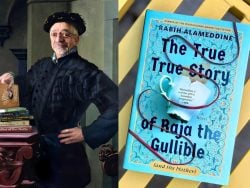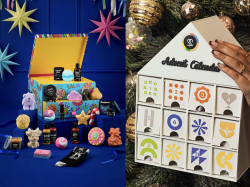Khoury / Yassine Duo Interview: When Great Minds Come Together
Beirut.com sat down for a quick chat with Edict Record Concert Series Performers Khoury / Yassine duo, a group comprised of Khaled Yassine and Elie Khoury. The duo is known to explore the possibilities of Oriental instrumental music with Yassine on percussion and Khoury on Oud and Buzuk.
Tell us about your relation ship with Elie. How it began, and how it evolved.
Khaled: It started back when we first met, and I wanted to learn Oud, and Elie wanted to learn percussion as well. After sitting together and jamming a few times, we noticed the harmony between us was very interesting and may help us produce music together. We actually broke each other’s taboos in music. For example, Elie used to believe that the “tabla” could never be part of his music, but because of the harmony we had, we evolved to a situation where it became a basic element of our music. Sometimes there are prejudiced approaches that only certain people with certain personalities can convince you to discard.
Your music is based on improvisation. How often are you subjects to blocks while playing together?
Khaled: When there is no inspiration, and you feel that the moment is simply not happening, it is good to stop for the day. Go home, get some sleep, and then come back with a different energy. Every musician who plays improvised music should realize that, and deal with these periods of emptiness. The other day, in the studio, this is exactly what happened to us. Yeah, it is always good to acknowledge the fact that one is not great every second. Not everything you do is necessarily always good. Knowing that relaxes us and allows us to face any problem that occurs by simply leaving and coming back with a fresh mind.
Elie: A few days ago, we were playing, and Khaled began asking me ‘where are you bro?’, then he started suggesting that we stop, but, I was in denial even though it was obvious that I was in the dry zone. So it’s always good to be aware of these situations in order to avoid these energy consuming inconveniences.
Now, about Edict Records, you [Khaled] have a major responsibility as artistic director; any person who approaches the company will have to go through you first. Will you treat them the way you wanted to be treated when you started your first leap to being a professional musician?
Khaled: I‘ve always treated people the way I treat myself. I am demanding with every person offering material, the same way I am demanding with myself. There are two projects I am involved in as a musician (percussionist) rather than artistic director, but it ends there. My ambitions don’t include dragging my own projects into this company. There’s another “space” for my own projects, whilst I prefer to keep my role in Edict Records focused on artistic direction.
Do you have a problem with collaborating with musicians who don’t have an academic knowledge in music?
Khaled: No, never. The sound is what defines the work. It, along with the performance and the skill of the musician, are what matter to us when collaborating. Generally, the company will produce all sorts of music that will be based essentially on improvisation. In this domain, the band leader is a composer and a player at most cases. If he plays well and attracts my attention, the only discussion will be around the composition. I will work on helping with pushing the composition and upgrading it without being a co-composer. What matters is to have the essence. The company will help as producers not as creators and my role will be set as the first listener, where trust in the musical taste plays the major role.
Other than this, what will you offer as a company?
Khaled: We will be working all the way with the musician, from the second the idea is set on the table, to the second the album is launched. It depends in some way on what the musician demands, whether he wants us to transfer him to a section we have in our company that will take care of contacting agents and scouting for concerts and gigs.
Is the oriental element a necessity in the music you are willing to produce?
Khaled: Not at all. In my opinion, I will always tend to avoid fusion and world music. For me there is more to music than that. There is a deeper point to reach, no matter where the music is originally from. Raw music will be mostly adopted by our company.
Elie, tell us about you early experience in music, and how did it start?
Elie: Well, it started with piano. I used to play the piano but it was so frustrating to me because I loved oriental music, and as you know, there is no ‘quarter sound’ on it, the sound that differs oriental from western music. Then, my father bought a Oud and I started teaching myself to play, and when I accidently discovered that ‘quarter’ I was telling you about, it was a glorious day for me because I was just a kid back then.
How did Khaled’s understanding of melodic affect your work on his project?
Elie: It didn’t only affect it. Without this particular fact, the project couldn’t ever happen. You can always meet a percussionist with a great technique but who doesn’t have this degree of understanding of the melodic element of the music, which is proportional to the taste of the musician in playing his instrument in which Khaled is more than great, so that made him a great partner on this work.
You are Lebanese and you have your own houses around here, but I recently realized that both of you are staying in a hotel. Is there are reason?
Elie: Honestly, the Holiday-inn management insisted on supporting us to the maximum. They decided to host every musician participating in this event, to offer a relaxing accommodation and a different ambiance for us while doing our work. It was supposed to be exclusive for the foreigner musicians but they decided to include us, since it is part of their program in supporting cultural events.
Can you tell us what methodology you are applying in having improvised music captured in an album?
Elie: This music is not free improving. There is a structure that holds the work. The variation happens when you play a certain theme written, in a different progression and rhythmic logic. You may always give a different taste to a certain musical phrase. The space of liberty in action differs from a location to another within the composition, not the phrase itself. We have many takes of the same musical phrase with different variations, and we choose one to go on the album.
When performing, what do you think about?
Elie: I may sometimes think about silly daily life details like whether I forgot to change the gas bottle for the stove, or maybe about a certain variations that could have made the overall performance better. The best moments though are when you don’t think. I think the way to reach this state is doing the work without forcing your mind on a certain goal. For example, if you happen to be recording with no intention of making an album, the result would be positively different. Even targeting an audience and worrying about whether they like what you playing when doing a solo may bring you down.
Khaled: A lot of times, even if you love the music you are playing, and are full of energy, you can even be affected by the person playing beside you. If he is having a block, he will bring you down no matter how much you throw positive hints (musically) and open new doors in the performance.
Interview by: Ilya D.
Edited by: Reina El Turk





